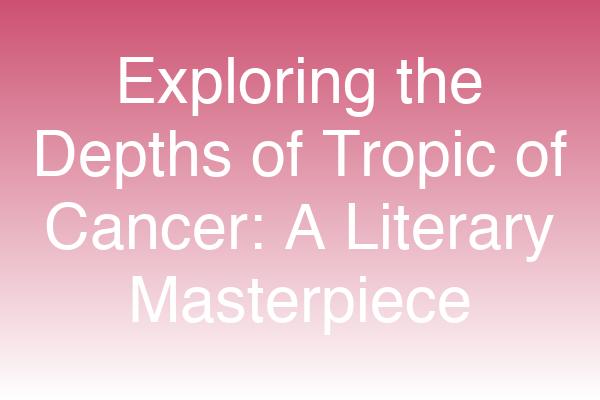
Introduction
Henry Miller's "Tropic of Cancer" is more than just a novel; it is a bold exploration of the human experience, freedom, and the artistic spirit. First published in 1934, this groundbreaking work has sparked controversy and admiration alike, establishing itself as a cornerstone of modern literature. In this blog post, we will delve into the themes, characters, and lasting impact of "Tropic of Cancer," providing insights that will enhance your understanding and appreciation of this literary masterpiece.
The Context of "Tropic of Cancer"
A Glimpse into the Author's Life
To fully appreciate "Tropic of Cancer," it’s essential to understand Henry Miller's life and the socio-political climate of the 1930s. Miller, an American expatriate living in Paris, drew heavily from his experiences, blending autobiography with fiction. His candid portrayal of life in a bohemian Paris, rife with poverty, love, and artistic struggle, sets the stage for the novel's raw and unfiltered narrative.
The Controversy Surrounding the Novel
Upon its release, "Tropic of Cancer" faced significant censorship due to its explicit content and frank discussions of sexuality. This controversy only fueled its popularity, making it a symbol of literary freedom. The novel was banned in the United States for nearly 30 years, but its eventual publication marked a pivotal moment in the fight for artistic expression.
Themes Explored in "Tropic of Cancer"
The Search for Identity and Freedom
At its core, "Tropic of Cancer" is a quest for identity. Miller's protagonist, also named Henry, embarks on a journey of self-discovery amidst the chaos of Parisian life. The novel explores the tension between societal expectations and personal freedom, a theme that resonates deeply with readers seeking their own paths in life.
The Role of Art and the Artist
Miller’s reflections on art and the artist's role in society are profound. He argues that true art emerges from the depths of personal experience and emotional honesty. This perspective challenges conventional notions of art as merely a product of technique, emphasizing the importance of authenticity in creative expression.
Love, Lust, and Relationships
The novel does not shy away from exploring the complexities of human relationships. Miller's candid depictions of love and lust reveal the often tumultuous nature of intimacy. His characters navigate a landscape of passion, betrayal, and longing, reflecting the multifaceted experiences of love.
Characters that Define the Narrative
Henry Miller: The Anti-Hero
The protagonist, Henry, serves as a semi-autobiographical representation of Miller himself. His struggles, desires, and philosophical musings invite readers to engage with his inner turmoil and aspirations. Through Henry, Miller articulates the universal quest for meaning and connection.
Supporting Characters: A Reflection of Society
The supporting cast in "Tropic of Cancer" is equally compelling. From the eccentric artists to the fleeting lovers, each character embodies different facets of the human experience. Their interactions with Henry not only drive the narrative but also enrich the thematic depth of the novel.
The Lasting Impact of "Tropic of Cancer"
Influence on Modern Literature
"Tropic of Cancer" has left an indelible mark on contemporary literature. Its candid exploration of taboo subjects paved the way for future authors to address similar themes without fear of censorship. Writers like Jack Kerouac and Charles Bukowski have cited Miller as a significant influence on their work.
A Reflection of the Human Condition
Even decades after its publication, "Tropic of Cancer" remains relevant. Its exploration of existential questions, the pursuit of happiness, and the complexities of human relationships continue to resonate with readers today. The novel invites us to reflect on our own lives and the choices we make.
Conclusion
In conclusion, "Tropic of Cancer" by Henry Miller is a literary tour de force that challenges conventions and invites readers to explore the depths of their own existence. Its themes of identity, freedom, and the role of the artist remain as poignant today as they were at the time of its publication. If you haven’t yet experienced this groundbreaking novel, now is the perfect time to dive into its pages and discover the world of Henry Miller.
Call to Action
Have you read "Tropic of Cancer"? Share your thoughts and interpretations in the comments below! If you enjoyed this exploration of Miller's work, consider checking out other literary analyses on our blog for more insights into the world of literature.
This blog post is designed to be engaging, informative, and optimized for search engines, ensuring that it reaches a wide audience while providing valuable content.